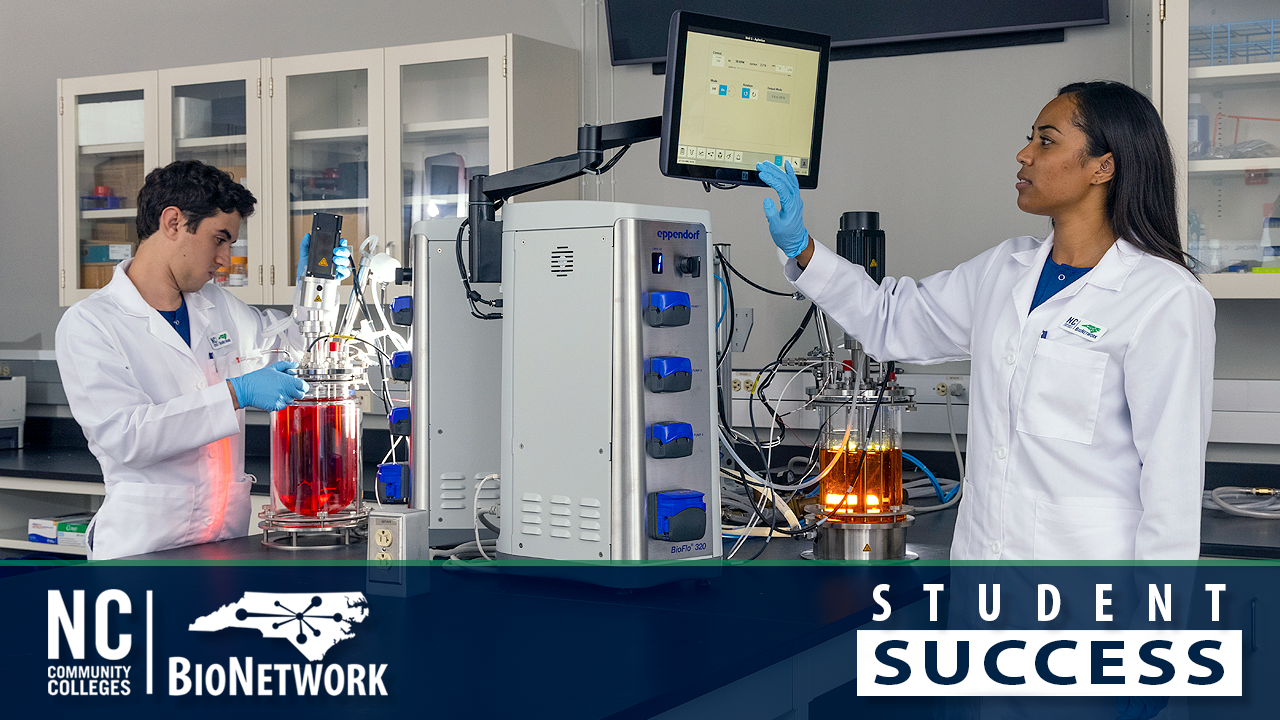 For years, the conventional wisdom was that career-hopping was not wise – that you should pick a lane and stay in it. But Sarah Cote believes a career story can have many chapters. There are often great reasons to change fields – and significant advantages.
For years, the conventional wisdom was that career-hopping was not wise – that you should pick a lane and stay in it. But Sarah Cote believes a career story can have many chapters. There are often great reasons to change fields – and significant advantages.
After working in several professions, Cote landed in a career in the biopharma industry that brought together all of her skill sets. A graduate of the single-semester BioWork course designed to give students the foundational skills for a career in biopharma manufacturing, Cote brought a nerves-of-steel, don’t-settle-for-less mindset to her career pivot. Her story has plenty of lessons for those who feel stuck.
Common Threads
 Cote remembers that as a young woman recently out of high school, she didn’t have much direction when she went to community college. “Nobody told me what to sign up for,” she says. “People may try to guide you here and there, but my experience was that you had to try something and see if you liked it.”
Cote remembers that as a young woman recently out of high school, she didn’t have much direction when she went to community college. “Nobody told me what to sign up for,” she says. “People may try to guide you here and there, but my experience was that you had to try something and see if you liked it.”
On a “whim,” she decided to sign up for machining classes and found that she loved the work. Cote got an associate’s degree in tool-and-die- and mold-making and went to work at a local manufacturing company that had been around for decades. “I started as a machine operator, and four months later, I was promoted into the machine shop, becoming the only female who had ever worked in that department,” she says. “My grandfather was a master tool-and-die maker, but I didn’t know that until after I was already in the industry. Learning that was neat – sometimes you don't know where your interests stem from.”
When more machining jobs began to go overseas, and Cote was among those laid off, she went back to school and got a second associate’s degree, this time in respiratory therapy.
“I really loved that work,” Cote says. “When you’re caring for people, you are paying it forward in a way. One day, you or somebody in your family might be in that same situation, and you want them to receive the best care possible. So when you become a medical professional, you strive every day to do that.”
She worked as a respiratory therapist for five years before realizing it was time for a change. “While I loved respiratory therapy, it can be hard because you do see your patients die,” Cote explains. “I was feeling burned out, so I decided to look into pharmaceuticals. I had always been interested in getting involved in the science behind medicine.”
Learning the Ropes
 Cote first heard about the BioWork course through LinkedIn, a career platform she has used extensively.
Cote first heard about the BioWork course through LinkedIn, a career platform she has used extensively.
“Then I communicated via LinkedIn with people who worked at Pfizer and other companies,” she recalls. “They said, ‘The BioWork class is only one semester, and it will give you a good baseline to see if you’ll like pharma.’ So I took the class with Dr. Lisa Smelser at Central Carolina Community College and realized that pharma was exactly where I wanted to be and what I'd been missing this whole time.”
Smelser was impressed with Cote’s drive.
“I think Sarah saw this as an opportunity to do something different that she was passionate about,” Smelser says. “She’s willing to do things that might not be her end game goal at the moment but will set herself up for good things in the future. I think BioWork was one of those things.”
While BioWork sets out to provide students with science education, that is not the only goal of the course, Smelser says.
“We do focus on hands-on technical skills to give students confidence, especially if they are making a transition like Sarah's from a different field,” she says. “But we also spend a lot of time making sure that students understand things like shift work and contract positions. That career development piece is a permanent and important part of the experience. We want to make sure that we're setting them up for success so they can articulate their transferable skills, walk out the door with a very strong resume, and be confident when talking with potential employers.”
Cote says the career development instruction was a big help for her for many reasons, including knowing what to expect that first day.
“When you work in pharma, you don’t just get dressed and go to work,” she explains. “To enter the area where you have to work, you might have to gown in and gown out two or three times. If you take this class, you're going to learn about gowning. You're going to learn about bacterial growth, and if you know where it comes from and how it's passed around, you’re going to understand why you have to sanitize and gown in and all of the other steps. It’s a lot of work, and you come away from BioWork with a good understanding of why you’re doing it. I’ve seen people come in having no idea about what’s going on, and they leave after a week. They expect a lot from you, so your heart really has to be in it.”
Making Tough Calls
 Cote’s early work experience in pharma brought great opportunities and tough choices.
Cote’s early work experience in pharma brought great opportunities and tough choices.
“After I finished in August 2020, Dr. Smelser would hook us up with these virtual career fairs through BioNetwork,” she says. “They are so helpful because you can do them from your home. You log onto one search engine, and you have an opportunity to talk to, say, 20 different people from 20 different companies. There's nowhere else that you could do that. Making connections is what it's all about. If you don't have the connections, you don't know about the opportunities, and you’re just going to stay where you are. You're not going to grow. And everybody wants to grow, right?”
Cote started out with contract work, and found that one assignment could quickly lead to a different one. She was able to get a wide range of experience and do work she found fascinating, including spending time as part of a COVID-19 vaccine manufacturing operation.
But Cote has a husband and two kids, and she reached a point where she knew she had to push for a full-time position with benefits and a shorter commute time. Fortunately, her networking efforts paid off.
“You can put an application in on a company’s website and never get a call back for an interview,” she says. “But at some companies, there is an internal recruiter program where employees get paid if someone they refer joins the company and the situation works out over a certain timeframe. I applied at Pfizer several times and never got a call back, but when I connected with a Pfizer employee through LinkedIn, I got a call back, and that's when my interview process started happening.”
 Cote says the story didn’t have an immediate happy ending because that job wasn't a good fit for her. But she later landed a great full-time position as a bioprocess technician at a Pfizer facility just a 15-minute drive from her home. It offered eight-hour shifts, benefits, and vacation time.
Cote says the story didn’t have an immediate happy ending because that job wasn't a good fit for her. But she later landed a great full-time position as a bioprocess technician at a Pfizer facility just a 15-minute drive from her home. It offered eight-hour shifts, benefits, and vacation time.
“I work on the CDA/Fill Team,” says Cote, who is pursuing a bachelor’s degree in biology on the side. “We weigh out raw material to the entire site. We are the start and finish to everything – the process starts with the raw materials being distributed and finishes with the fills being completed.
"Pfizer is a great place to start out and grow your career over time, and I enjoy being a part of a growing industry with a main focus of patient care.”
Cote believes her earlier work experiences helped prepare her for her new career.
“If you take the machines and the medical background and the people work, that's everything that a pharmaceutical job is,” she says. “I’d love to be an inspiration for young girls who really don't know what direction to take. Pharma is a great career path with a lot of good benefits, so if they take a chance, try it out, and they end up making a career out of it, that would be great to see.”
Lessons from Sarah’s Story
- Don’t take the first opportunity that comes along if it’s not right for you. As Cote began doing interviews, she found herself making tough decisions from the get-go. She interviewed with a maintenance manager at a big pharma company, and on paper it made sense: Her tool-and-die background was a great match for that kind of work, which involves maintaining machines (and everything else) in a manufacturing facility. But Cote wanted to be a process technician, so she didn’t pursue the maintenance opening.
- On the flip side, don’t let yourself get derailed by holding out for a perfect first job. If you’re patient, you’ll get opportunities to move from an imperfect first assignment into others that line up more closely with what you want to do. Cote held out for a job in a pharma operation where she could learn an aspect of process technician work, and even though the exact assignment was not what she wanted to do long-term, she was invited to interview for different roles within weeks, and she changed roles twice.
- Be willing to make short-term sacrifices. Some positions you’re offered early on might have some tough aspects, such as a challenging schedule or a long commute. One of Cote’s jobs required a three-hour round-trip commute, and while she found that the time investment was tough to maintain over the long haul, she valued the job experience.
- Don’t hesitate to take a contract opportunity. Many people just starting out in pharma get their foot in the door through contract jobs that give them hands-on experience. These jobs can lead to permanent, full-time offers.
- Don’t hesitate to stand up for yourself to move past contractor status. The experience Cote got through contract positions was crucial, but she says “there comes a time when you have to advocate for yourself” and find a full-time job that recognizes your experience and your financial needs. Contract positions don’t offer long-term job security, and it can be tough to go without benefits for a long stretch. Cote also learned that the transition from contract to full-time status can involve a sacrifice: Some companies have a rule about hiring contractors in as permanent employees at the lowest experience/pay level, even if they have been doing work at higher experience levels for quite awhile. Cote believes that if you have put in the time and have the experience, that should be reflected in the hiring offer.
- Always look ahead. Cote recommends being proactive about your next opportunity, especially if you are working as a contractor in order to get that valuable early experience. “If you have a one-year contract, it’s a good idea to begin looking around before your one year is up,” Cote says. “It might take you three, four or even six months to get hired on somewhere. If you wait too long to start, you might find yourself out of work.”